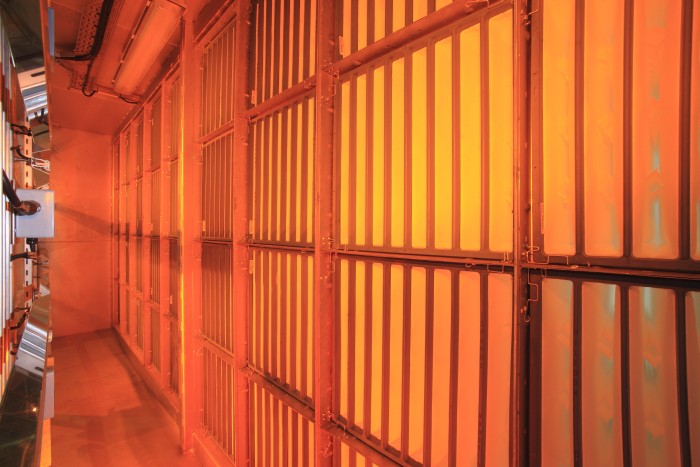
Infrared Technology Keeps Ships Running in Winter

Gas turbines are throttled if filters are iced up.
To function properly, gas turbines need air for combustion. However, that air must be free from dust and other particles and is, therefore, always filtered. Cold and wet intake air in winter months can easily cause icing-up of the filters.
The filters then let little air pass through and the gas turbine has to be throttled or switched off – of all times in the season it is needed most. Mostly, the filters used are made of fleece, and often they consist of many small units inside a large filter
housing. Gas turbines are supplied with intake air from the outside, and especially at low outside temperatures combined with cold and wet air, the fleece filters can easily ice up. Therefore, the filters need to be protected to preserve the filtering effect and the air flow.
A British plant manufacturer has tested different anti-icing systems and decided to use a Heraeus Noblelight infrared system in a gas compressor plant in Germany.
The tests showed that an infrared module consumes less energy and is easier to install than other technologies. Three modules were installed, which are controlled by a thermostat that switches the emitters on when the outside temperature drops below a certain value and off again if the temperature reaches a preset value. The infrared modules are compact and very robust, and reliably function even under clammy conditions.
Gates of locks can no longer be used if they are iced up.
Shipping must stop if locks are iced up. At six weirs with locks in the Danube and the river Inn, Heraeus Noblelight infrared emitters make sure the locks can be operated also in severe winters.
The infrared emitters are installed horizontally at the weirs' lower sluices. Splash water cannot affect quartz glass infrared emitters, because quartz glass has a very small thermal expansion coefficient, and hence is very well resistant to thermal shocks.
The electrical connections are protected against water by a patented housing (made by the Heraeus customer Elektro Neumayer).
Iced coal cannot be moved.
Bulk goods such as ore or coal, which are transported by rail in metal cars, may freeze together into large lumps in cold and wet weather. Doors and flaps cannot be opened and it is difficult to empty the cars completely. Infrared heat can help here. The cars are heated from the outside, so that the coal lumps thaw.
Have further questions about photon-based solutions from ultraviolet to infrared?
Write us an e-mail to hng-presse@heraeus.com
Video: Optimum energy efficiency with specialty light sources
Heraeus Noblelight GmbH
Heraeusstrasse 12-14
63450 Hanau
Phone +49 6181 35 8492
Fax +49 6181 35 16 8492
E-Mail: hng-info@heraeus.com












